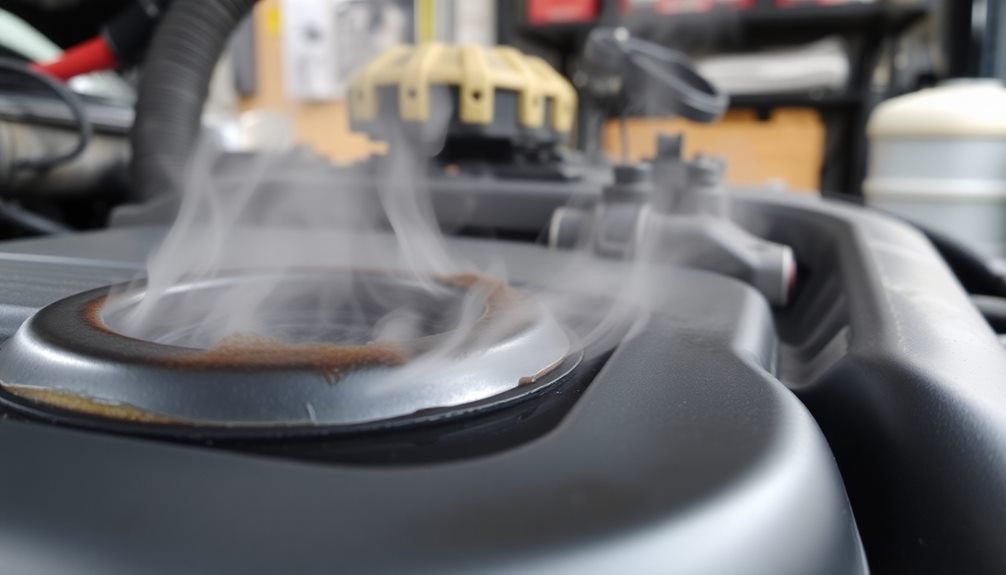If you notice a blown head gasket, you might smell something sweet and syrupy, like candy or maple syrup. This odor happens because coolant is leaking into the combustion chamber. Sometimes, you'll also catch a burnt oil scent along with it, suggesting your engine has issues. You're more likely to notice this smell during low speeds or when idling, especially in traffic. While the smell may seem familiar, it's a warning sign. Don't ignore it, as it could lead to serious engine problems. To stay informed, keep exploring how to spot and fix these automotive issues!
Key Takeaways
- A blown head gasket often emits a sweet, syrupy odor resembling maple syrup or candy due to coolant leaking into the combustion chamber.
- The sweet smell may be accompanied by a burnt oil scent, indicating potential engine issues.
- This odor is more noticeable when idling, in traffic jams, or after a long drive.
- Ignoring this smell can lead to severe engine problems, including overheating and potential fire hazards.
- Prompt investigation of unusual smells is crucial to avoid costly repairs and ensure safety.
Introduction
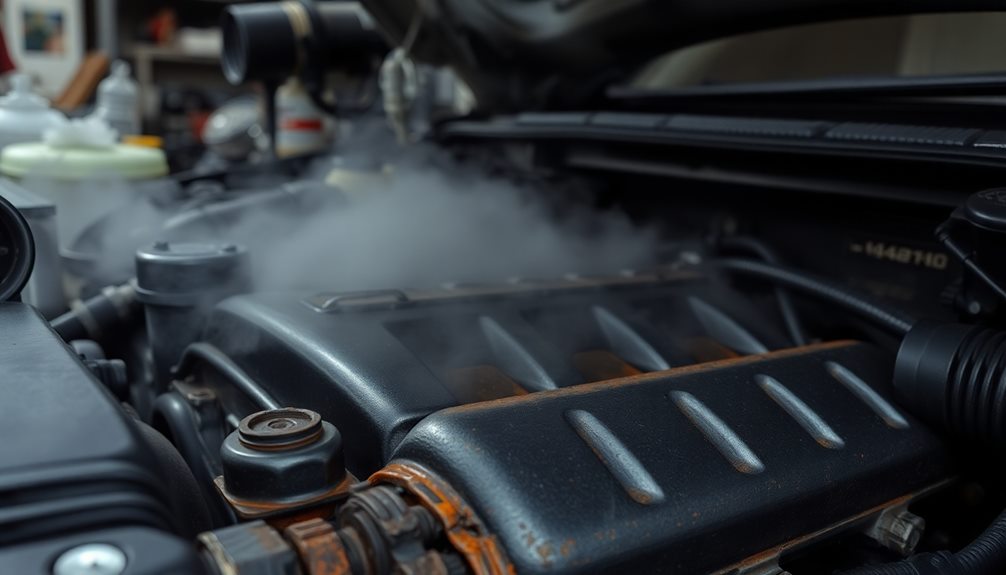
A blown head gasket can lead to various issues in your vehicle, and recognizing the signs is crucial for preventing further damage. When this part fails, it can cause coolant to leak into the engine, leading to overheating and other serious problems. You might notice your engine running hot or see white smoke coming from the exhaust. These symptoms are your vehicle's way of telling you something's wrong!
You should also keep an eye on your coolant levels. If they seem to drop unexpectedly, it's a red flag. Additionally, check for any oil mixing with your coolant, which can create a milky substance. This can be an indication that the gasket has blown.
It's essential to act quickly, as ignoring these signs can lead to more expensive repairs down the line. Taking good care of your car and knowing what to look for can save you time and money.
If you suspect a blown head gasket, it's best to consult a mechanic right away. They can help diagnose the problem and get you back on the road safely. Remember, your vehicle relies on you to pay attention!
Description of the Smell
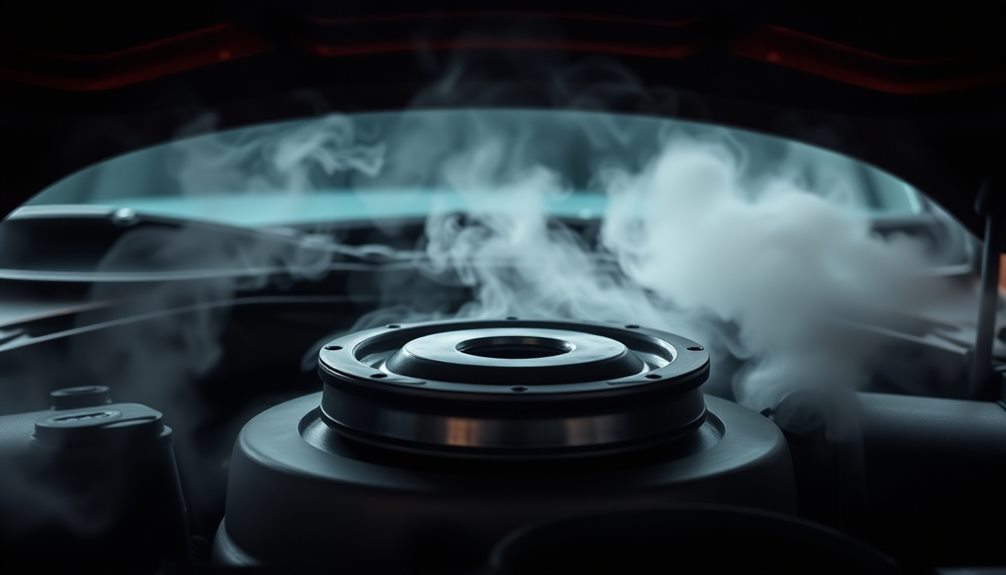
When you notice a sweet, syrupy odor coming from your engine bay, it could signal a blown head gasket. This smell often resembles maple syrup or candy, which might seem pleasant at first, but it's a warning sign you shouldn't ignore.
It's essential to pay attention to this unusual scent, as it indicates something's gone wrong under the hood. As you lean in closer, you might even catch a hint of burnt oil mixed with that sweet aroma.
This combination can be unsettling, especially since it's not something you want to associate with your car. The smell can waft through the cabin, making you wonder what's happening beneath the surface.
If you're out driving and suddenly catch a whiff of this strange scent, you'll likely feel a mix of curiosity and concern. Take a moment to assess the situation.
Is your engine overheating? Are there any warning lights on your dash? Remember, your car communicates with you through these smells.
Paying attention can help you catch issues early and avoid costly repairs down the road. So, trust your nose and act quickly!
Source and Composition
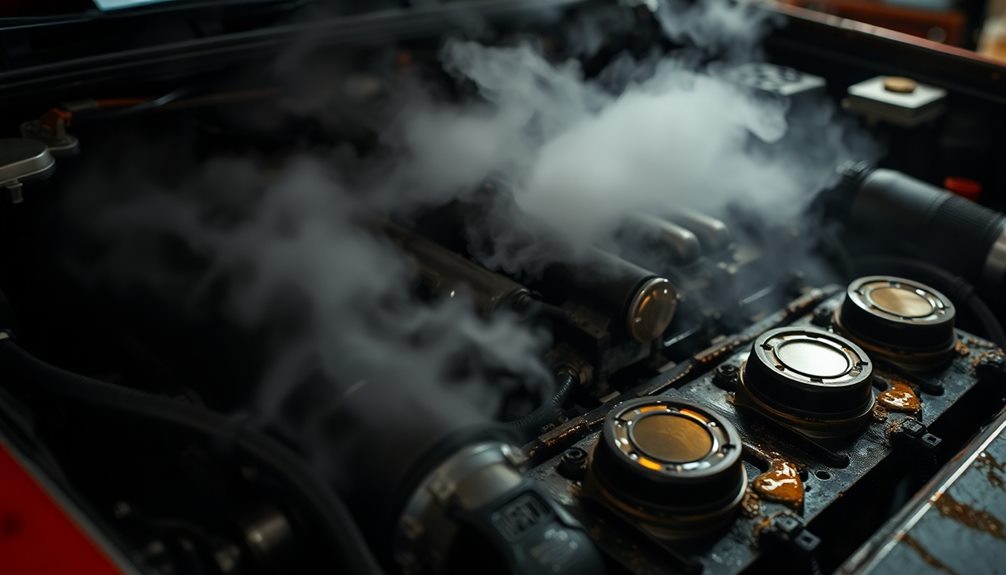
The source of that sweet, syrupy smell often comes from coolant leaking into the engine's combustion chamber due to a blown head gasket. When this happens, the coolant mixes with the fuel and air, creating a unique scent that can be quite noticeable. You might first think of a sweet dessert, but it's not something you want to smell in your car!
Coolant, or antifreeze, is usually a bright green or orange liquid, designed to keep your engine cool. If your head gasket fails, this precious liquid escapes where it shouldn't be—inside the engine instead of circulating properly. As it burns, it releases those sweet fumes that tickle your nose and signal a problem.
The composition of these smells comes from various chemicals in the coolant, including ethylene glycol, which is responsible for that sugary scent. While it might remind you of candy, it's a warning sign!
If you catch a whiff of this odor, it's time to investigate further. Ignoring it could lead to more significant engine issues down the road, and nobody wants that! So, keep your senses sharp and don't let that sweet smell go unchecked.
Typical Scenarios or Environments

You might encounter that sweet, syrupy smell in various scenarios, especially when your vehicle is idling or running at low speeds.
Picture this: you're stuck in traffic, and suddenly, that odd scent fills the air. It's not your favorite snack; it's possibly a sign of trouble under the hood.
This smell can also pop up when you're parked for a while, letting your engine cool down. If you've just finished a long drive and notice it, pay close attention. Sometimes, it can be more noticeable during hot weather when your engine works extra hard.
Another common scenario is during a routine check-up. If your mechanic runs the engine for diagnostics and you catch that aroma, it's a good idea to ask questions. You want to stay ahead before a small issue becomes a big problem.
In these situations, always trust your senses. If that sweet scent wafts through, it's worth investigating. Ignoring it might lead to more serious issues down the road.
Emotional or Cultural Associations

A blown head gasket can evoke a mix of emotions and cultural associations, often tied to the nostalgic scent of sweet antifreeze. For many, this smell might remind you of childhood road trips, when the car was packed with snacks and the excitement of adventure filled the air. You might picture the joy of cruising down the highway, windows down, music blasting.
However, that sweet scent can quickly shift to a feeling of dread when you realize it signals trouble under the hood. You might recall the moment you first smelled it, perhaps during a car maintenance session with a parent or friend, turning a simple task into a bonding experience.
Culturally, cars are often symbols of freedom and independence. When you catch a whiff of antifreeze, it might make you think of the responsibilities that come with owning a vehicle.
It's a reminder of how much we rely on our cars for daily life, work, and play. So, whether it brings back fond memories or a hint of anxiety, the smell of a blown head gasket connects us to our experiences and the journeys we've taken.
Health or Safety Considerations
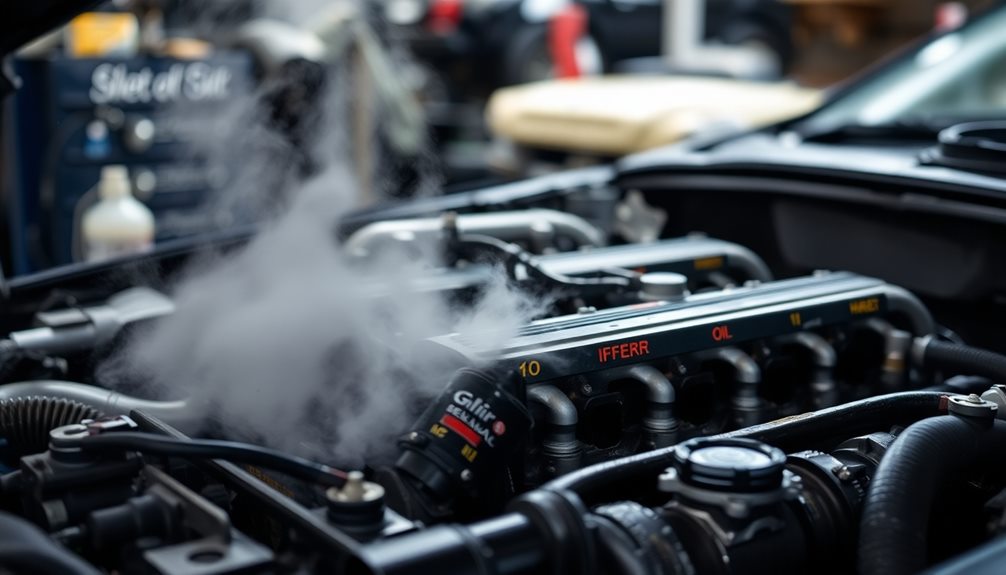
When dealing with a blown head gasket, it's crucial to recognize the potential health and safety risks involved. A blown head gasket can lead to leaks of harmful substances, like coolant and oil, which may create hazardous fumes.
If you notice a sweet, syrupy smell or a strong odor of burning oil, it's best to take action quickly. Breathing in these fumes can irritate your lungs and skin, so don't hesitate to step outside for fresh air.
Additionally, overheating engines can pose a serious safety risk. If your engine gets too hot, it might lead to more severe damage or even a fire. That's why you should keep an eye on your temperature gauge and turn off your engine immediately if it starts to rise unexpectedly.
Always remember to wear gloves and a mask when checking for leaks or handling fluids, as they can be toxic.
If you're unsure about what to do, it's wise to consult a professional mechanic. They can help ensure your car—and you—stay safe. Taking these precautions will keep you healthy while you address that pesky blown head gasket!
Final Thoughts
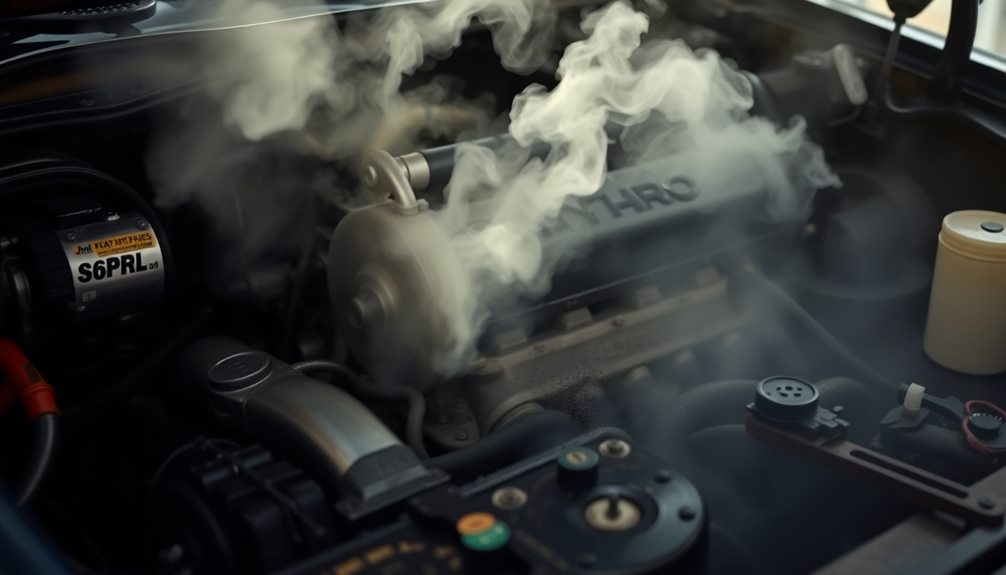
In conclusion, recognizing the signs of a blown head gasket is essential for maintaining your vehicle's health and safety. If you notice any strange smells, like burnt oil or sweet antifreeze, it's time to pay attention. These odors can signal serious problems under the hood. Don't ignore them!
It's important to understand that a blown head gasket can lead to costly repairs and even dangerous situations. By staying aware of your car's performance, you can catch issues early. Keep an eye out for overheating, coolant leaks, or unusual smoke. If you notice these signs, consider getting your vehicle checked by a professional.
Remember, your car is a big investment, and taking care of it means you can enjoy many safe and happy miles on the road. Plus, addressing problems early can save you money in the long run.
So, the next time you catch a whiff of something odd, don't hesitate. Trust your instincts and take action!
Your vehicle deserves the best care, and you'll be glad you did. Stay proactive, and keep your ride running smoothly for years to come!
Frequently Asked Questions
Can a Blown Head Gasket Cause Engine Overheating?
Yes, a blown head gasket can cause engine overheating. It disrupts the coolant flow, allowing hot gases to escape into the cooling system, leading to increased temperatures and potential engine damage if not addressed promptly.
How Can I Confirm a Blown Head Gasket Smell?
To confirm a blown head gasket smell, pay attention to any unusual odors, like sweet or burnt smells. Check for coolant leaks or white smoke from the exhaust, which can indicate serious engine issues.
What Other Symptoms Accompany a Blown Head Gasket?
You might notice overheating, white smoke from the exhaust, coolant loss, or milky oil. Engine performance could decline, and you may hear unusual sounds. Pay attention to these signs to catch potential issues early.
Is the Smell Different for Diesel Engines?
Yes, the smell from a blown head gasket in diesel engines can differ due to the fuel's composition. You might notice a stronger, more acrid odor compared to gasoline engines, indicating potential issues needing immediate attention.
How Much Does It Cost to Repair a Blown Head Gasket?
Repairing a blown head gasket can cost you between $1,000 and $2,500, depending on your vehicle's make, model, and labor rates. It's crucial to get quotes from several mechanics to find the best deal.
